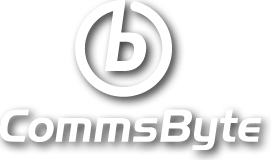
What is Malware?
The term Malware is derived from malicious software and is used to describe a software that is used to steal private data, compromise company security and cause harm to a computer/network.
The term Malware is used to describe a huge variety of malicious software. Comms-Byte have compiled a list of five common malware types that you need to be wary of.
Word of warning: The following list is by no means exhaustive. As this is an evolving business, new malware programs are being developed constantly so we advise that you are always aware and cautious.
Virus
A computer virus is much like a biological virus, except that it makes your computer very sick. It replicates and spreads to other computers by attaching itself onto programmes, files or documents. It then implements a code when you open the infected file and begins to infect your computer. They can steal information, harm a network and host computers, cause financial damage and carry out much more profound and damaging effects.
Ransomware
Ransomware is a type of malware that demands a ransom for holding a computer captive. The ransomware locks down the computer or encrypts files and then demands that you pay for the release of your computer and files. Ransomware is spread through downloaded documents which can be from email or suspicious websites. They can also happen through vulnerabilities within the network.
Spyware
Spyware is a malware that records your activity on a computer without your knowledge. They aim to collect your banking information, various account passwords and monitoring your activity and keystrokes to send to potential fraudsters. Spyware can be found in software vulnerabilities and are often found attached alongside Adware, some legitimate software or Trojans.
Adware
Adware is malware that displays advertisements on your computer which include pop-up ads, redirecting to specific advertising websites and advertisements on software. These can come with a software or application and are offered for ‘free’ to the user. They serve as a revenue generator but in some cases, these can be accompanied with spyware, which is used to steal information and personal data.
Trojan Horse
A Trojan Horse which is known more commonly as a Trojan is malware which disguises itself as a legitimate software or application and tricks users into downloading/opening it. Upon opening the malicious file, it will: give access to a remote party, who will use this to steal your personal data, such as financial banking information and login details; change settings or files on your computer; watch your computer activity or download more malicious software.
How can I be safe?
There is lots you can do to prevent malware infections but here are some recommendations:
- Choose a reliable and trustworthy anti-malware and firewall software which can successfully detect, quarantine and remove various malware infections. Both an anti-malware and firewall should ensure that any incoming and existing data, which impose a risk, is scanned, flagged up and removed from your computer.
- Be careful when you download files, programmes or any applications to your computer. If something looks suspicious, send it to your IT Helpdesk immediately.
- Keep all your software and operating systems up to date with the latest patching. Patching repairs any system vulnerabilities to maintain security within information systems.

